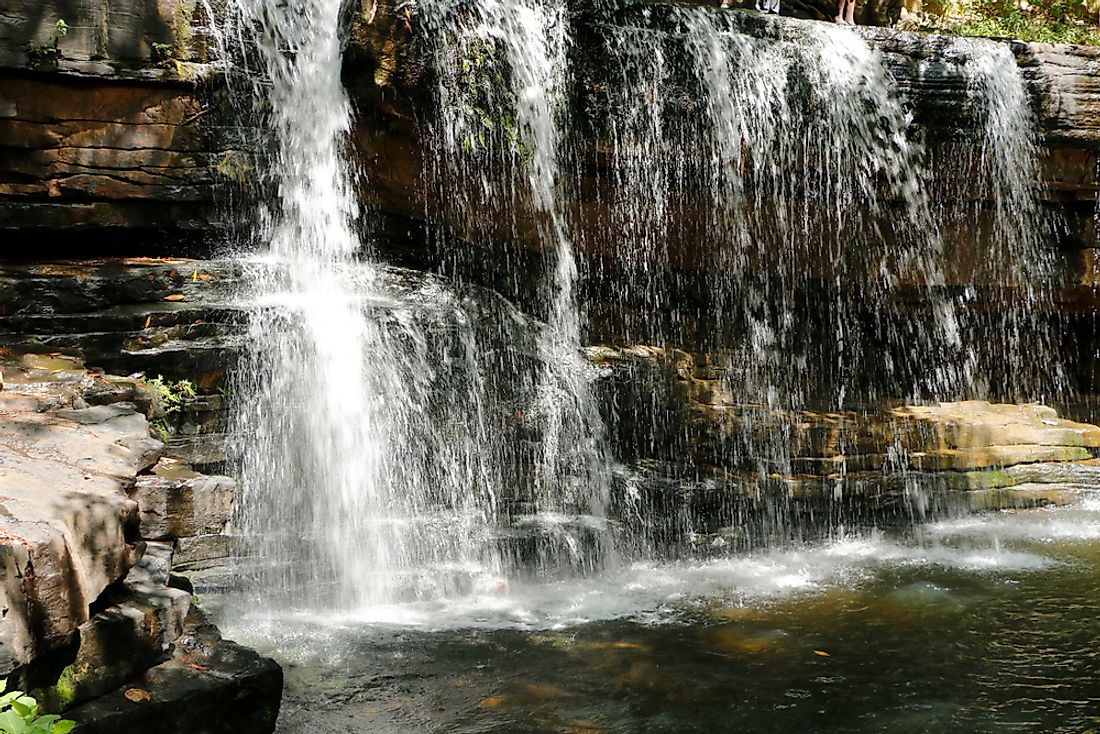Ecological Regions Of Benin

Benin is a Sub-Saharan country situated in West Africa bordered by four countries. Its tropical climate has two alternating dry and rainy seasons yearly. Its agricultural economy depends much on cotton found mostly in its northern regions near Djougou. Despite its small size, Benin's landscape varies greatly from dense forests to savanna grasslands. Although about 65% is blanketed by bushy vegetation, grasslands cover a significant 93.1% of the highlands. The ecological regions have received government and international conservation attention due to the rapid population growth that has affected its natural resources in such short time.
Eastern Guinean Forests
Tropical and Subtropical Moist Broadleaf Forests dominate the eastern regions of Benin. Seasonal rainfall of 80 inches affects this region with cool winds coming from the Atlantic and dry winds from the Sahara. This creates a greenhouse climate that makes moist forests thrive although deforestation remains a threat. Most of the 2000 tree and plant species here are related to the Congolian forest flora that includes vascular plants. Larger fauna includes leopards, chimpanzees, hawk eagles, and ungulates. Avians include woodpeckers, fishing owls, and warblers. Indiscriminate hunting has adversely affected the fauna of this ecoregion.
Nigerian Lowland Forests
Tropical and Subtropical Moist Broadleaf Forests in Benin are lowland forests, scattered among settlements in the area. These forests range from the Dahomey Gap in the east to the west near the Niger River. It is separated by swamp forests from the mangroves. Flora is made up of Leguminosae and Meliaceae plants. Wide-spreading trees and herbaceous creepers grow abundantly here although deforestation is a high concern. Fauna is comprised of elephants and chimpanzees of which the latter is on the threatened list. Main conservation of flora and fauna protection has been in declaring areas of importance as forest and game reserves.
Guinean Forest-Savanna Mosaic
Grasslands, shrublands, and savanna are the fixture of the forest-savanna mosaic region of Benin. This ecoregion divides the moist forests from the inland savannas in most of West Africa. Extending from the southern regions of Benin to its coastline, this ecoregion has Lophira laceolata trees dot grasslands that are occasionally subjected to open-land fires. Habitats shelter elephants, leopards, tortoises, antelopes, lizards, and monkeys. Avians dominate the wetland areas. Current conservation effort is not evident in the area, and hunting activities threaten the wildlife here.
West Sudanian Savanna
Tropical and subtropical grasslands, shrublands, and savannas are the main habitats of this ecoregion in Benin. Long elephant grass and tall tree species prevail over the dry savannas of this region. Poaching and hunting have but totally decimated the fauna population of the area. Deforestation due to high population demand has also reduced the remaining resources. The long, hot, dry season is seasonally cooled down by rainfall of about 600mm in the Sahelian region and about 1000 mm in the southern areas. Acacia, long grasses, herbs, and shrubs depend on this rainfall. Rodents, reptiles and avian species occupy a niche in the savanna grasslands. Bird migration along its corridors has been affected by hunting and reduced.
Other Ecoregions
Some other ecological regions found in Benin are in the Lower Niger-Benue with the Nilo-Sudan Freshwater ecoregions that are subjected to seasonal flooding which is home to about 202 fish species; the Bight Coastal featuring the Nilo-Sudan Freshwater ecoregions where the river gains access to the flat coastal areas from the plateaus. Fish, frogs, waterbirds, and mollusks thrive here; and the Bight Coastal with its Marine ecoregions where its sand barriers, intertidal, mangroves are threatened Marine life biodiversity is abundant here.
Ecological Regions Of Benin
| Ecoregions of Benin | Biome |
|---|---|
| Eastern Guinean Forests | Tropical and Subtropical Moist Broadleaf Forests |
| Nigerian Lowland Forests | Tropical and Subtropical Moist Broadleaf Forests |
| Guinean Forest-Savanna Mosaic | Tropical and Subtropical Grasslands, Savannas, and Shrublands |
| West Sudanian Savanna | Tropical and Subtropical Grasslands, Savannas, and Shrublands |
| Lower Niger-Benue | Nilo-Sudan Freshwater |
| Bight Coastal | Nilo-Sudan Freshwater |
| Gulf of Guinea | Marine |







